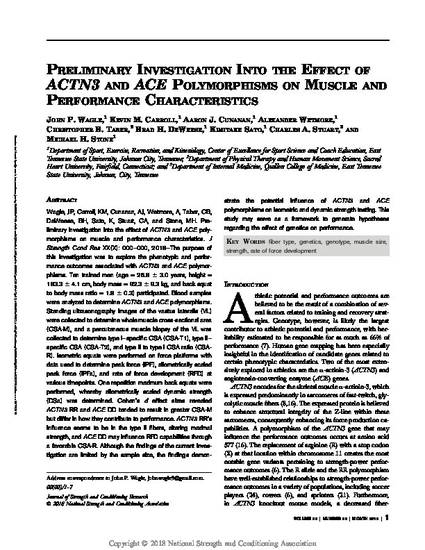
Preliminary investigation into the effect of ACTN3 and ACE polymorphisms on muscle and performance characteristics. J Strength Cond Res XX(X): 000-000, 2018-The purpose of this investigation was to explore the phenotypic and performance outcomes associated with ACTN3 and ACE polymorphisms. Ten trained men (age = 25.8 ± 3.0 years, height = 183.3 ± 4.1 cm, body mass = 92.3 ± 9.3 kg, and back squat to body mass ratio = 1.8 ± 0.3) participated. Blood samples were analyzed to determine ACTN3 and ACE polymorphisms. Standing ultrasonography images of the vastus lateralis (VL) were collected to determine whole muscle cross-sectional area (CSA-M), and a percutaneous muscle biopsy of the VL was collected to determine type I-specific CSA (CSA-T1), type II-specific CSA (CSA-T2), and type II to type I CSA ratio (CSA-R). Isometric squats were performed on force platforms with data used to determine peak force (IPF), allometrically scaled peak force (IPFa), and rate of force development (RFD) at various timepoints. One repetition maximum back squats were performed, whereby allometrically scaled dynamic strength (DSa) was determined. Cohen's d effect sizes revealed ACTN3 RR and ACE DD tended to result in greater CSA-M but differ in how they contribute to performance. ACTN3 RR's influence seems to be in the type II fibers, altering maximal strength, and ACE DD may influence RFD capabilities through a favorable CSA-R. Although the findings of the current investigation are limited by the sample size, the findings demonstrate the potential influence of ACTN3 and ACE polymorphisms on isometric and dynamic strength testing. This study may serve as a framework to generate hypotheses regarding the effect of genetics on performance.
Wagle, J., Carroll, K., Cunanan, A., Wetmore, A., Taber, C., Deweese, B., Sato, K., Stuart, C. A., & Stone, M. H. (2021). Preliminary investigation into the effect of ACTN3 and ACE polymorphisms on muscle and performance characteristics. Journal of Strength and Conditioning Research, 35(3), 688-694. doi: 10.1519/JSC.0000000000002809

Open access journal. Epub ahead of print.